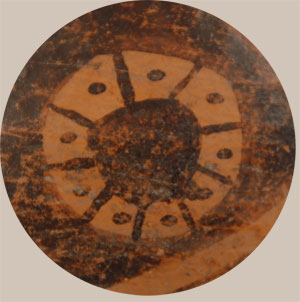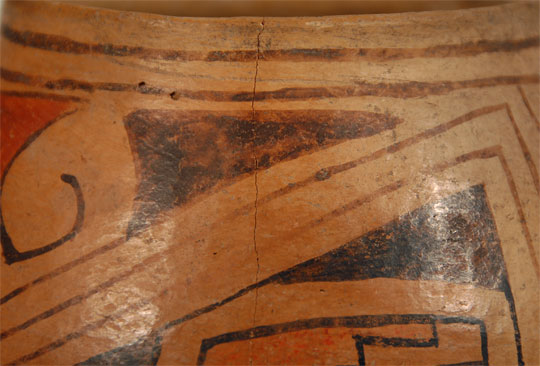Paquimé Pueblo Casas Grandes Chihuahua Mexico [SOLD]
+ Add to my watchlist Forward to Friend
- Category: Historic
- Origin: Casas Grandes, Mexico
- Medium: clay, pigments
- Size: 6” tall x 7” diameter
- Item # C3251R SOLD
Pre-Hispanic pottery from the Chihuahua culture of present-day Mexico varies in slight but distinct ways to an extent that Archaeologists have separated them into groups of which the three most important ones are Ramos Polychrome, Villa Ahumada Polychrome and Babícona Polychrome. Ramos Polychrome is the most recognizable with its red designs outlined in black, as in this jar.

Ramos Polychrome is from the Paquimé Pueblo in the State of Chihuahua, Mexico, which existed from 1200 to 1450. The vessel shapes of jars are generally globular with rounded bottoms. During this period, which has been named the Medio period, the pueblo grew in population and underwent an explosive building expansion in multi-storied pueblo houses, water and sewage systems and ball courts. More importantly for us, pottery went from a utilitarian object to an art form.
This Ramos Polychrome jar is an extraordinarily beautiful example of the pottery of the period. It is a thin-walled vessel with rounded bottom and slightly rolled out rim. The black and red design on cream slip is typical of the period. The round element with black dots in squares has the appearance of a celestial object in a night sky. The meaning of any decorative element is unimportant. It is the overall design that is intriguing and impressive.
Condition: the jar appears to have never been broken. There is a short vertical crack from the rim only in one area. Overall, it is in excellent condition.
Provenance: from the collection of Katherine H. Rust
Recommended Reading:
- The Desert Southwest: Four Thousand Years of Life and Art by Allan Hayes and Carol Hayes
- Secrets of Casas Grandes, edited by Melissa S. Powell

- Category: Historic
- Origin: Casas Grandes, Mexico
- Medium: clay, pigments
- Size: 6” tall x 7” diameter
- Item # C3251R SOLD



